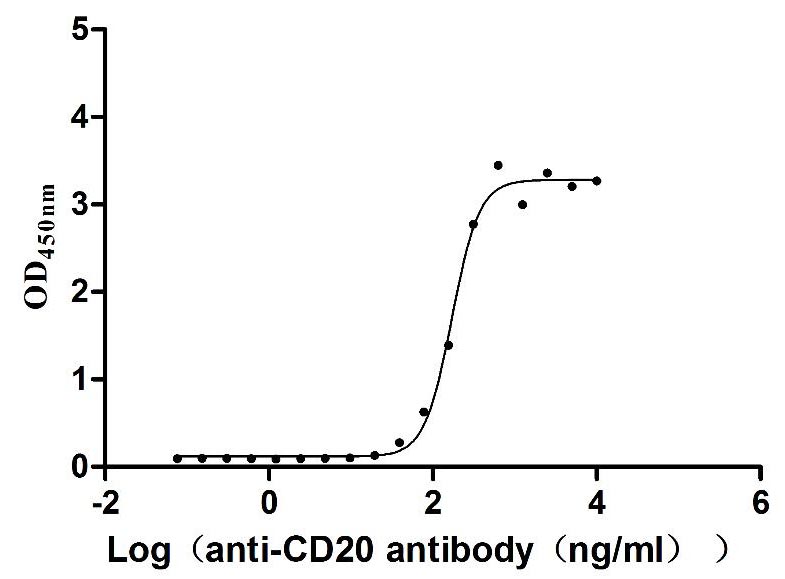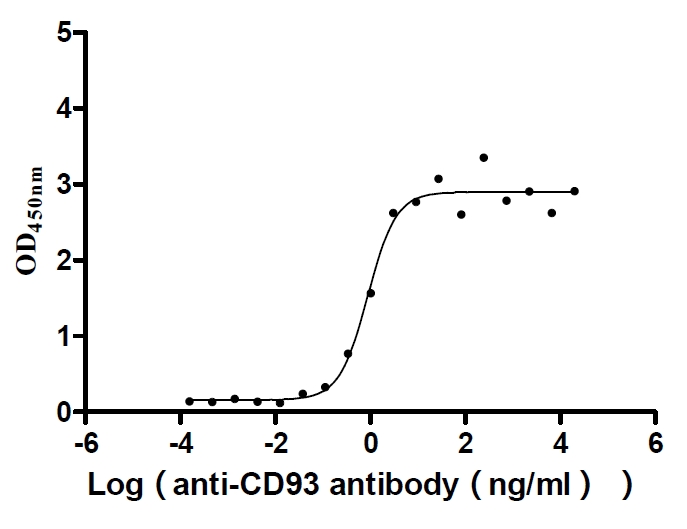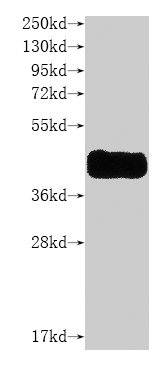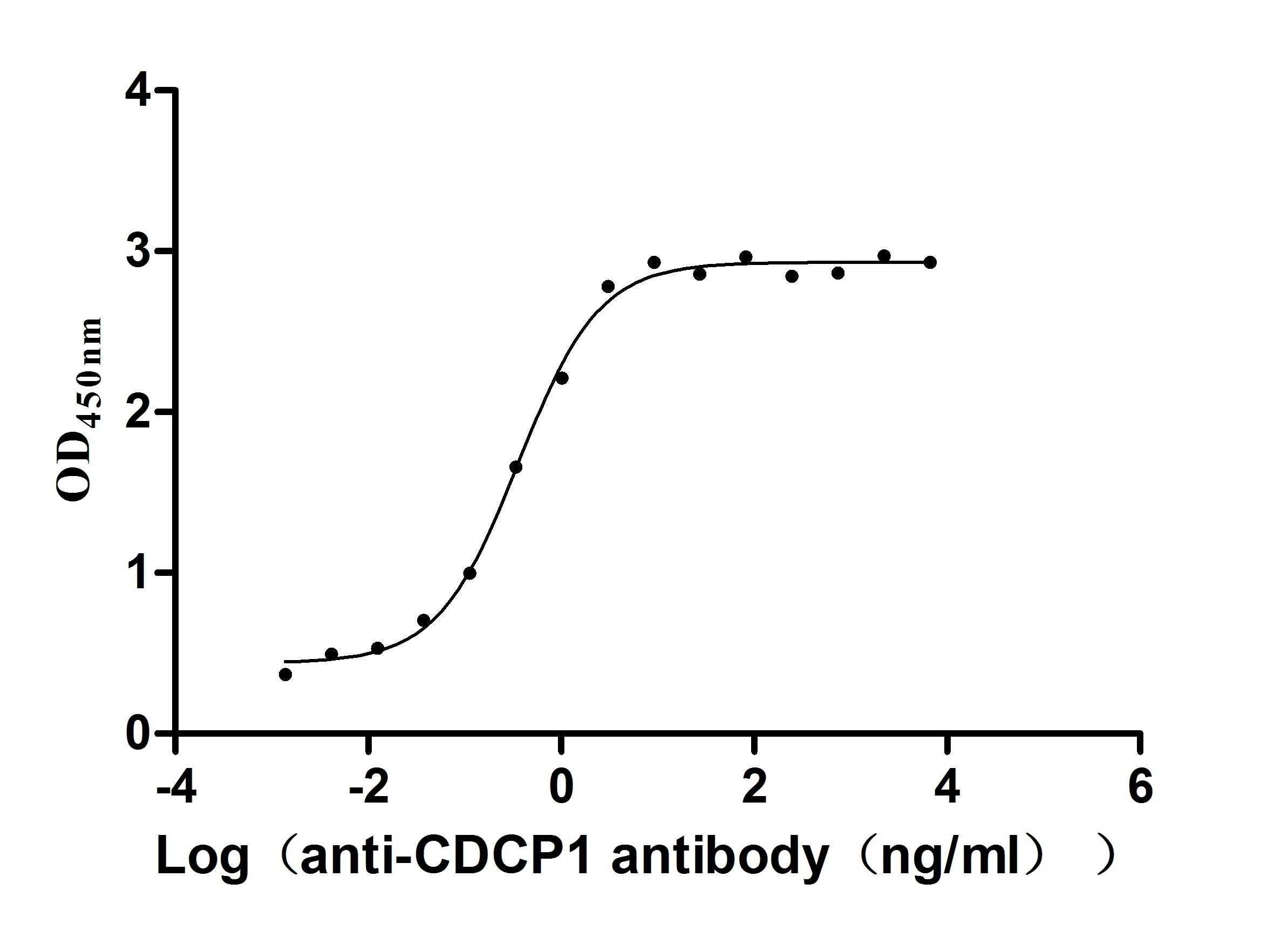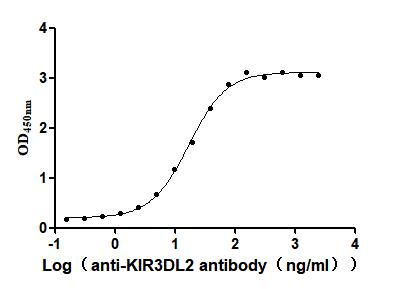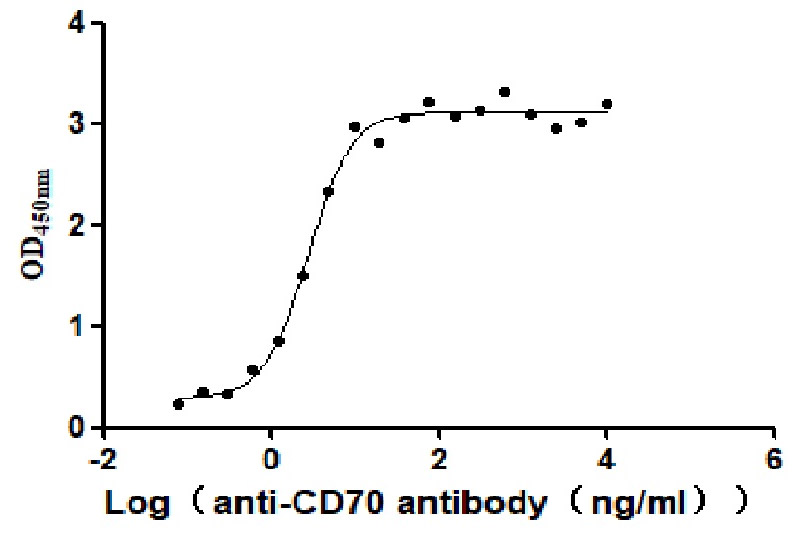Recombinant Mouse Single-stranded DNA cytosine deaminase (Aicda)
In Stock Promotion-
中文名称:Recombinant Mouse Single-stranded DNA cytosine deaminase(Aicda)
-
货号:CSB-EP001487MO
-
规格:¥2328
-
促销:

-
图片:
-
其他:
产品详情
-
纯度:Greater than 90% as determined by SDS-PAGE.
-
基因名:
-
Uniprot No.:
-
别名:Aicda; Aid; Single-stranded DNA cytosine deaminase; EC 3.5.4.38; Activation-induced cytidine deaminase; AID; Cytidine aminohydrolase
-
种属:Mus musculus (Mouse)
-
蛋白长度:Full Length
-
来源:E.coli
-
分子量:31.5 kDa
-
表达区域:1-198aa
-
氨基酸序列MDSLLMKQKKFLYHFKNVRWAKGRHETYLCYVVKRRDSATSCSLDFGHLRNKSGCHVELLFLRYISDWDLDPGRCYRVTWFTSWSPCYDCARHVAEFLRWNPNLSLRIFTARLYFCEDRKAEPEGLRRLHRAGVQIGIMTFKDYFYCWNTFVENRERTFKAWEGLHENSVRLTRQLRRILLPLYEVDDLRDAFRMLGF
Note: The complete sequence including tag sequence, target protein sequence and linker sequence could be provided upon request. -
蛋白标签:N-terminal 10xHis-tagged and C-terminal Myc-tagged
-
产品提供形式:Liquid or Lyophilized powder
Note: We will preferentially ship the format that we have in stock, however, if you have any special requirement for the format, please remark your requirement when placing the order, we will prepare according to your demand. -
缓冲液:Tris-based buffer,50% glycerol
-
储存条件:Store at -20°C/-80°C upon receipt, aliquoting is necessary for mutiple use. Avoid repeated freeze-thaw cycles.
-
保质期:The shelf life is related to many factors, storage state, buffer ingredients, storage temperature and the stability of the protein itself.
Generally, the shelf life of liquid form is 6 months at -20°C/-80°C. The shelf life of lyophilized form is 12 months at -20°C/-80°C. -
货期:3-7 business days
-
注意事项:Repeated freezing and thawing is not recommended. Store working aliquots at 4°C for up to one week.
-
Datasheet & COA:Please contact us to get it.
相关产品
靶点详情
-
功能:Single-stranded DNA-specific cytidine deaminase. Involved in somatic hypermutation (SHM), gene conversion, and class-switch recombination (CSR) in B-lymphocytes by deaminating C to U during transcription of Ig-variable (V) and Ig-switch (S) region DNA. Required for several crucial steps of B-cell terminal differentiation necessary for efficient antibody responses. May also play a role in the epigenetic regulation of gene expression by participating in DNA demethylation.
-
基因功能参考文献:
- AID has a role in transcription elongation for mutagenesis in B cells PMID: 29593215
- MMSET promotes AICDA-mediated DNA breaks at the donor switch region during immunoglobulin class switch recombination. PMID: 29158395
- Results indicate activation-induced cytidine deaminase (AICDA) as a driver of epigenetic heterogeneity in B-cell lymphomas with potential significance for other tumors with aberrant expression of cytidine deaminases. PMID: 29335468
- findings suggest that activation of Tnf-Aicda axis and co-inhibitory signals to T cells in coordination with Th1-type immunity has critical roles in the immune response against Hepatitis B virus infection PMID: 28063995
- the role of phosphorylation on AID serine38 in AID activity at the Immunoglobulin switch region and off-target Myc gene, is reported. PMID: 29122947
- Class switching correlates with replication origin activation in immunoglobulin genes;R loops contribute to the specification of origins of replication; Origin activation is independent of AID and DNA breaks PMID: 27974207
- The reduced expression of activation-induced cytidine deaminase (AID). PMID: 28407558
- this study shows that enforced expression of Sox2 in splenic B cells severely inhibits AID expression and IgH class switch recombination PMID: 28188246
- Aid loss in mice leads to expansion of myeloid cells and reduced erythroid progenitors resulting in anemia, with dysregulated expression of Cebpa and Gata1, myeloid/erythroid lineage-specific transcription factors PMID: 28077417
- UNG deficiency reduces B cell clonal expansion in the germinal center in mice and blocks the proliferation of tumor B cells expressing AID. PMID: 27697833
- Efficient chemoprotection of CDD and MDR1 transduced hematopoietic 32D as well as primary lin(-) cells was proven in the context of Ara-C and anthracycline application PMID: 26651614
- this study indicate that inflammation-induced AID expression promotes skin cancer development independently of UV damage and suggest AID as a potential target for skin cancer therapeutics. PMID: 26974156
- Molecular mechanism of Aid interaction with RNA-binding proteins, dimer formation and it's role in DNA-cleavage and recombination PMID: 26929374
- DNA methylation dynamics of germinal center B cells are mediated by AID. PMID: 26365193
- Demonstrate the importance of AID in generating an appropriate B1a cell response to pathogenic bacteria. PMID: 26456931
- AID-induced mutations are prone to generate double-strand breaks PMID: 26263206
- Unlike deletion of the AID C terminus, 3 of the substitution mutants reduce DNA double-strand breaks (DSBs) detected within the Sm region in splenic B cells undergoing class switch recombination . PMID: 26267846
- Study demonstrates that intronic switch RNA acts in trans to target AID to S region DNA. AID binds directly to switch RNA through G-quadruplexes formed by the RNA molecules. PMID: 25957684
- The effect of insertion of transcribed intronic S regions in a locus (Igkappa)strongly recruiting AICDA on class switch recombination is reported. PMID: 26146363
- Study finds AID targets somatic hypermutation (SHM) hotspots within V exon and S region passengers at similar frequencies and that the normal SHM process frequently generates deletions, indicating that SHM and class-switch recombination employ the same mechanism. PMID: 26582132
- Splice variants of activation induced deaminase (AID) do not affect the efficiency of class switch recombination in murine CH12F3 cells PMID: 25803053
- genetic deficiency in spontaneously autoimmune B6.Nba2 mice impairs production of anti-nuclear antibodies, a hallmark of systemic lupus erythematosus PMID: 25634361
- AID deficiency inhibits DSA-mediated aortic vasculopathy after aorta transplantation in mice. PMID: 25769064
- HSP90 inhibitors indirectly target AID in vivo PMID: 25912253
- class switch recombination is programmed to occur in a productive deletional orientation and does so via an unprecedented mechanism that involves in cis Igh organizational features in combination with frequent S-region DSBs initiated by AID PMID: 26308889
- Observed an activity-dependent induction of BDNF exon IV mRNA expression, which correlated with reduced DNA methylation within the BDNF P4 promoter. Knockdown of AID disrupted these effects and inhibited BDNF exon IV mRNA expression. PMID: 25041363
- These data suggest that Aid does not have crucial functions in DNA demethylation during induced pluripotent stem cell generation. PMID: 24718089
- B cell Rab7 mediates induction of activation-induced cytidine deaminase expression and class-switching in T-dependent and T-independent antibody responses. PMID: 25740947
- results elucidate the molecular basis of AID cytoplasmic retention, define its functional relevance and distinguish it from other mechanisms regulating AID. PMID: 25824822
- miR-155 controls the outcome of the the germinal center reaction by modulating its initiation (Aicda) and termination (Socs1/p53 response). PMID: 25645925
- AID target genes are enriched in chromatin modifications associated with active enhancers (such as H3K27Ac) and marks of active transcription (such as H3K36me3) in both fibroblasts and B cells PMID: 25512519
- Chronic lung injury by constitutive expression of activation-induced cytidine deaminase leads to focal mucous cell metaplasia and cancer. PMID: 25659078
- our results suggest a stringent and sophisticated control of Aicda by a novel IL-10/miR-155 PMID: 25381386
- Study reports that the majority of detectable AID off-target activity in a variety of mouse and human lymphoid or nonlymphoid cell types occurs within focal regions of overlapping sense/antisense transcription within intragenic super enhancers. PMID: 25483776
- AID activity and its relationship to chromosome folding and the B cell regulome was studied; find that AID-mediated lesions occur predominantly within B cell super-enhancers and regulatory clusters; further show that the structural and transcriptional features of these domains help explain AID tumorigenic activity in the B cell compartment of mice and humans. PMID: 25483777
- AICDA does not appear to be required for tumor development in the two virus-induced tumor mouse models. PMID: 24569264
- IkappaB-zeta regulates TLR-mediated CSR by inducing AID PMID: 25124037
- RNA exosome regulation of ncRNA recruits AID to single-strand DNA-forming sites of antisense and divergent transcription in the B-cell genome, thereby creating a link between ncRNA transcription and overall maintenance of B-cell genomic integrity PMID: 25119026
- Results indicate a role for apurinic/apyrimidinic endonuclease (APE) 2 (Apex2) in the protection of germinal center (GC) cells from activation-induced cytidine deaminase (AID)-independent damage. PMID: 24935922
- To have dominant negative (DN) function, AID lacking the C terminus (DeltaAID) must have deaminase activity, suggesting that its ability to induce double-strand breaks is important for the DN function. PMID: 24973444
- Activation-induced deaminase-coupled DNA demethylation is not crucial for the generation of induced pluripotent stem cells. PMID: 24083501
- GANP regulates the choice of DNA repair pathway by DNA-PKcs interaction in AID-dependent IgV region diversification. PMID: 24808370
- findings suggest that S regions are preferred targets for AID and, aided by polypyrimidine tract binding protein-2, act as "sinks" to sequester AID activity from other genomic regions. PMID: 24879790
- A domain of AID is required to link the DNA damage step with the subsequent repair during CSR as well as for chromosomal translocations, a collateral effect of class switch recombination. PMID: 24591601
- Hypoxia within spheres together with loss of Zeb1 repression synergize to cause superinduction of Hif1a, which in turn leads to induction of the DNA demethylase Aid/Aicda, demethylation of the Oct4 promoter/enhancer and multipotency. PMID: 23554223
- Murine Aicda(-/-) GC B cells accumulate as centrocytes and inefficiently generate plasma cells. PMID: 24244021
- Fate mapping and AID reporter mice were used to determine if AID expression in the mouse extends beyond lymphocytes. PMID: 23861962
- GANP-mediated chromatin modification promotes transcription complex recruitment and positioning at immunoglobulin variable loci to favour AID targeting. PMID: 23652018
- Precise regulation of the Aicda promoter appears to depend on a coordinated balance of activities between enhancer and silencer elements. PMID: 23613851
- studies identified a late step of reprogramming associated with methylation status, and implicated a secondary set of pluripotency network components; AID regulates this late step, removing epigenetic memory to stabilize the pluripotent state PMID: 23803762
显示更多
收起更多
-
亚细胞定位:Nucleus. Cytoplasm.
-
蛋白家族:Cytidine and deoxycytidylate deaminase family
-
组织特异性:Expressed in germinal center B-cells (at protein level).
-
数据库链接:
KEGG: mmu:11628
STRING: 10090.ENSMUSP00000040524
UniGene: Mm.391503
Most popular with customers
-
Recombinant Human 5'-nucleotidase (NT5E) (Active)
Express system: Mammalian cell
Species: Homo sapiens (Human)
-
Recombinant Mouse Claudin-18 (Cldn18)-VLPs (Active)
Express system: Mammalian cell
Species: Mus musculus (Mouse)
-
Recombinant Dog B-lymphocyte antigen CD20 (MS4A1)-VLPs (Active)
Express system: Mammalian cell
Species: Canis lupus familiaris (Dog) (Canis familiaris)
-
Recombinant Human Complement component C1q receptor (CD93), partial (Active)
Express system: Mammalian cell
Species: Homo sapiens (Human)
-
Recombinant Human C-C chemokine receptor type 8 (CCR8)-VLPs (Active)
Express system: Mammalian cell
Species: Homo sapiens (Human)
-
Recombinant Human CUB domain-containing protein 1 (CDCP1), partial (Active)
Express system: Mammalian cell
Species: Homo sapiens (Human)
-
Recombinant Human Killer cell immunoglobulin-like receptor 3DL2 (KIR3DL2), partial (Active)
Express system: Mammalian cell
Species: Homo sapiens (Human)
-
Recombinant Human CD70 antigen (CD70), partial (Active)
Express system: Mammalian cell
Species: Homo sapiens (Human)



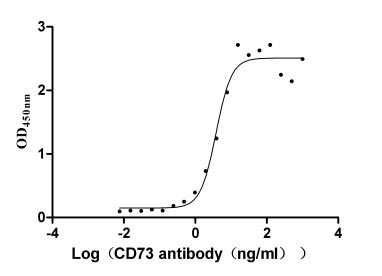
-AC1.jpg)
